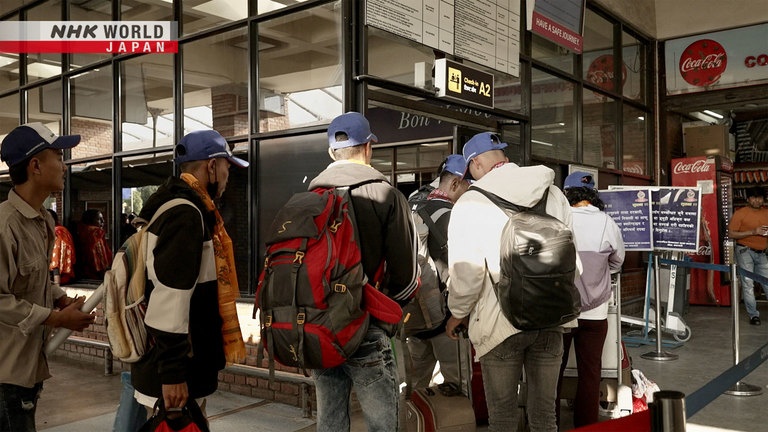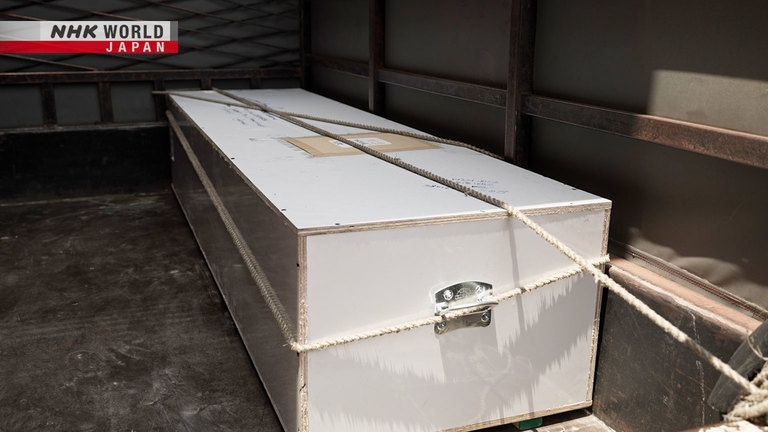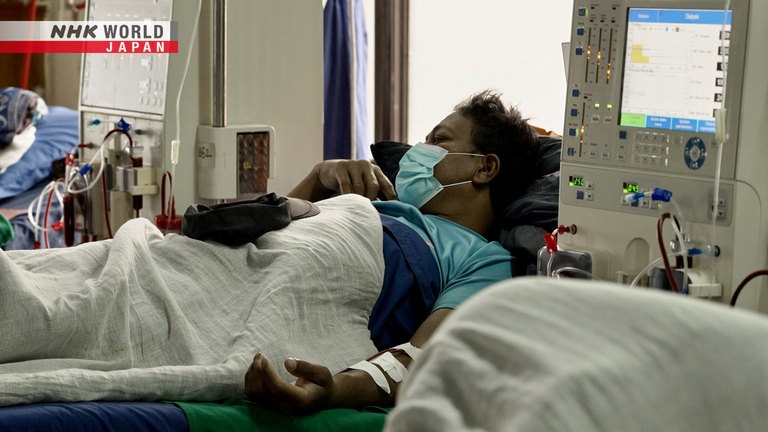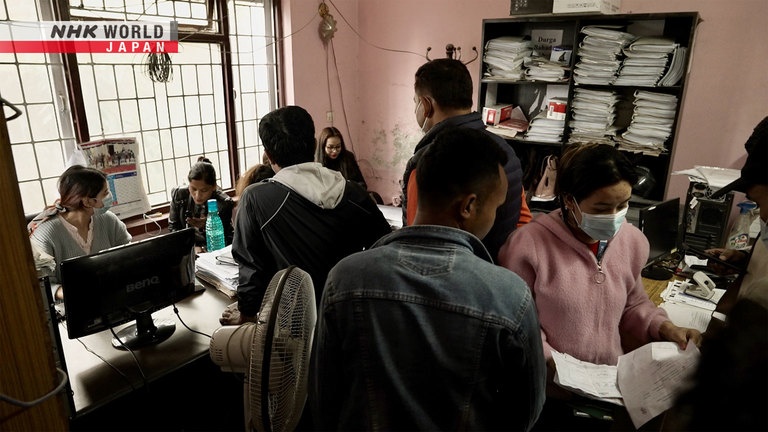The Reality Faced by Nepal's Workers Overseas
Due to limited options available in their home country, many Nepali workers travel to locations such as the Middle East and Malaysia to send home funds that support the lives and education of their families. However, the work conditions they find waiting for them are often harsh, and many sustain kidney damage. Some even lose their lives, leaving families to support themselves. In this episode, we speak to the workers who face these conditions for the good of their families.




Transcript
An international airport in Nepal's capital of Kathmandu...
Every day, a large number of migrant workers depart the country here.
Their numbers amount to more than 1000 per day.
Currently, some 2 million Nepali people work overseas.
The money they send home comes to a quarter of Nepal's GDP,
providing vital support to the country's economy.
I need to make plenty of money to send home
so that I can support my family.
That's why I work overseas.
The majority of Nepal's citizens make their livelihoods farming.
To keep their families out of poverty,
many seek the far better pay provided by work in other countries.
However, the work conditions awaiting them in the Middle East
and other such locations are often extremely harsh.
I told the company that we didn't
have enough water to drink.
It was awfully hot,
but water was the real problem.
In environments lacking sufficient water supplies,
the toll taken on workers' health is significant.
Some even lose their lives, never to return home again.
These are my late husband's clothes.
Seeing them makes me cry for him.
Humble dreams, only to end in ruin.
This is the harsh reality faced by migrant workers from Nepal.
Lumbini Province is located in western Nepal.
It's one major source of migrant workers travelling overseas.
We've reached the fields.
At 6 a.m., one mother brings her children with her to the fields.
Urmila Lodh receives work from the landowner,
harvesting crops and doing other labor to make ends meet.
Bring the bag over here.
When there's work to be done,
I put in 4 hours or so in the morning.
I don't even make a couple dollars.
It isn't enough to support our family.
It barely puts food on the table.
Urmila's husband travelled abroad to work in 2015.
Tragically, he would never return home alive.
Urmila was left to raise their 4 children on her own.
The survivor pension provided by the government comes to only 20 US dollars a month.
She has a hard time gathering enough food for her children.
I need to work several different jobs.
We get some food working on farms.
That's how we survive.
My daughters are happy with anything,
but sometimes my son is a picky eater.
My girls understand the situation,
so they accept what we have to eat.
My son is still too young to understand.
Urmila's husband Ram had travelled to Qatar when a construction rush was at its peak.
He worked building a massive skyscraper, toiling long hours.
Before going to Qatar, he'd worked in
construction and farming here in Nepal.
His work managed to keep us afloat.
But there isn't much more you can do here.
He wanted to work overseas to provide for
our children.
In 2022, Ram's body was returned to Nepal upon his death.
We often look at his photos.
We remember him so clearly.
It makes us cry when we see them.
This was the death certificate issued in Qatar that was sent to Urmila along with Ram's body.
To her, the cause of death is incomprehensible.
There was no clear reason for his death.
I heard that he took a shower after work,
ate dinner, and later died in his sleep.
That's all I know.
The number of migrant workers who perish overseas totals as many as 1,000 per year.
The majority of incidents are in the Middle East or Malaysia.
Their deaths are commonly attributed to vague causes such as natural factors or heart failure.
Those that do make it home often carry major health problems with them.
Nepal's largest dialysis center is located in Kathmandu.
Sujan Thami is one of the laborers who had journeyed overseas for work.
He's been a patient at the center for 5 years now.
Set blood flow to 250.
250?
The doctor said to raise it.
Sujan went to work in Qatar in 2017.
In just 1 year, he sustained kidney damage, forcing him to return home.
I worked as a pipelayer on a construction site.
Hard work.
It was awfully hot,
but water was the real problem.
With so many people working there,
there wasn't cold water to go around.
But the seawater was cool,
so we drank that instead.
I think that drove my blood pressure up.
The higher blood pressure must have
put a strain on my kidneys.
Sujan visits the center 3 times a week for dialysis, spending 4 hours for each session.
He's rented a room from an acquaintance living on the outskirts of the city.
Do you have trouble climbing the stairs?
Do I ever.
My chest hurts.
It isn't always this bad, but it hurts
on days when I get dialysis.
Summers in Qatar exceed 40°Celsius.
Sujan recalls not being allowed to keep hydrated during the work.
I told the company that we didn't
have enough water to drink.
But the foreman promised to bring it,
and then did nothing.
Did you know that it isn't good for you
to drink seawater?
I had no idea.
Other people were drinking it,
so I thought it'd be OK.
It was salty, but it hit the spot.
I didn't know it was any different
from drinking river water.
As a former soldier, Sujan had confidence in his stamina.
He never imagined that construction work could lead to kidney failure.
I couldn't believe what had happened.
If I'd stayed in my own country,
I probably would have kept healthy.
I wanted to save away money,
and do something for my future.
I thought I could save for old age,
but there's no hope for that now.
One doctor specializing in kidney treatment at the dialysis center
has seen a constant stream of patients among returning workers.
That is not normal because these patients are usually young.
Young people, if they receive good treatment,
then they will not end up with kidney failure.
Most probably, this is because of heat stress, chronic dehydration,
working environment or food habits during their working in the countries.
Before travelling overseas to work,
citizens of Nepal are required to undergo a standard health inspection.
Blood, urine, and x-ray tests are conducted in order to certify health and obtain permission for the labor.
The government also conducts training sessions before departure in order to ensure worker safety.
Some jobs have 12 hours of work per day.
It could be over 18 hours with overtime.
You need to drink water regularly.
Take care to drink at least 1 liter
of water per day of work.
You should drink more of it if you're
working in the Middle East.
To keep the workers safe overseas,
the sessions cover basic topics such as accidents in transit or at the workplace.
Despite these efforts,
the number of laborers who return home sick or injured remains a major concern.
Those who come back to Nepal in poor physical condition find their ability to work limited,
driving them and their families into even worse poverty than when they departed.
In northern Kathmandu, this road is a major transit route for the city.
I'll take a black tea.
Here you go.
Dilsari Kami's husband was left unable to work due to kidney damage.
To make up for this,
she earns money selling tea to taxi drivers here starting at 2 a.m. in the morning.
I'll buy cigarettes too,
so cut 5 rupees off of it.
I just can't.
Your husband said it's fine.
Who are you talking about?
Your husband.
I'm sure he didn't.
You'll need to pay the rest.
I don't have it.
Please be reasonable.
You'll need to pay.
I wish I had a better source of income.
But I accompany my husband to treatment
3 times a week, so this is my only choice.
We use this money to pay for my husband's medicine,
our rent, and our children's schooling.
When Dilsari finishes selling at 6 a.m., she returns to her home not far from the road.
In this one-room apartment with a tiny kitchen, her entire family resides.
Wake up, dear.
The five of us live here together.
Our youngest daughter sleeps here.
In order to support his family, Buddhi had worked in Saudi Arabia for over 10 years.
I had been a farmer before.
To earn more for my children,
I began going overseas for work.
I thought that I could give them
a better education.
However, Buddhi returned from the country 3 years ago due to kidney failure.
Desperately needing to receive treatment for his condition,
he and his family uprooted their lives and moved 500 km to live in Kathmandu.
Compared to the countryside, prices are high in the city.
Their one-room apartment was the best they could afford.
I take two kinds of medicine before breakfast,
and five after.
- Every day?
- That's right.
Buddhi needs to take a total of 9 kinds of medicine a day.
Since health insurance doesn't cover the medicine for kidney treatment,
almost their entire family budget goes to cover it.
Stepping up to take care of her younger siblings,
Buddhi's daughter Tika quit school at age 15.
I like helping my mom out.
Which is more important to you?
Helping your mother, or going to school?
Helping my mother.
Your education is much
more important!
Her younger brother and sister receive public schooling in order to keep costs down.
- What do you want to be in the future?
- A doctor.
What would you like to do?
Help my father!
You want to help him?
So he gets better!
He said that he wanted to attend a private school,
but we could only afford a nearby public one.
Private schools cost US$110
in entrance fees alone.
He said, "If you need it for your treatment,
I understand."
Hearing that pained me so much.
I never received an education, but I thought
that my work could give my children a better one.
But I was never able to achieve that.
As workers continue to face hazardous conditions overseas, an NGO exists to offer them support.
This is a legal aid office in Kathmandu that was opened to help laborers travelling overseas.
With cases ranging from nonpayment to health problems, over 50 people a day consult with the office.
In order to receive compensation from companies,
they'll need to submit reports and evidence to the Nepalese government.
The lawyers of the NGO assist people with those procedures.
For the past 3 years, lawyer Rukmani Thapaliya has done her best to help the migrant workers.
What was the problem?
They didn't pay me in Dubai.
I asked them to at least cover my rent.
In the end, I had to rely on my family.
Based on Rukmani's interactions,
workers typically raise no complaint until after they've returned to Nepal.
Most of the workers give the companies
their passports to hold.
Without much local experience, they're worried that
if they complain, the company will get back at them.
They do their work while cowering in fear.
The legal office works with government agencies in an attempt to resolve the issues.
I'm heading out.
Rukmani walks to a government department that's situated nearby their law office.
A wide variety of functions related to overseas work are performed here,
from filing the immigration paperwork to resolving employment disputes.
One of the Department's most important roles is to conduct observation and direction of staffing companies
to make sure they follow proper protocol with workers and businesses overseas.
Could you call the staffing company to ask
about the issue?
It needs additional paperwork.
Whether due to deceptive staffing companies or a lack of proof,
resolution of cases can require considerable time.
Rukmani has worked on 380 cases over the past 6 months,
but more than half of them have yet to be completed.
This may go on until we can seek out
a comprehensive solution.
There are many different cases,
and the solutions aren't simple.
I hope to keep doing all I can
for migrant workers overseas.
Dilsari, who sells tea to support her husband's treatment, accompanies him to the dialysis center.
Since there's risk of him collapsing, he needs her constant assistance.
The dialysis system filters the toxins
out of my body that accumulate from food.
That's a big relief to me.
Buddhi hopes to eventually receive a kidney transplant,
but the testing of donors and surgery itself are extremely expensive.
Recently, his daughter Tika has begun saying that she too wants to work overseas.
I don't want to put her in that situation,
but I have no choice.
I'd be worried about her doing laundry
and dishes in a Kuwait or Qatar home.
But what can I say to her?
I regret not having been able to fulfill
my role as a father.
It's been some time since Buddhi and his family prayed at a temple together.
We prayed for our happiness.
If I can recover, it should bring
greater joy to my children.
Buddhi hopes to regain the ability to support his family.
But at the moment, all he can do is pray.
Even now, Nepali people continue to travel overseas with the dream of giving better lives to their families.
I know the work over there will be hard,
but I'll try my best.
I have a younger brother and sister.
I need to provide for my family.
We can't make ends meet here.